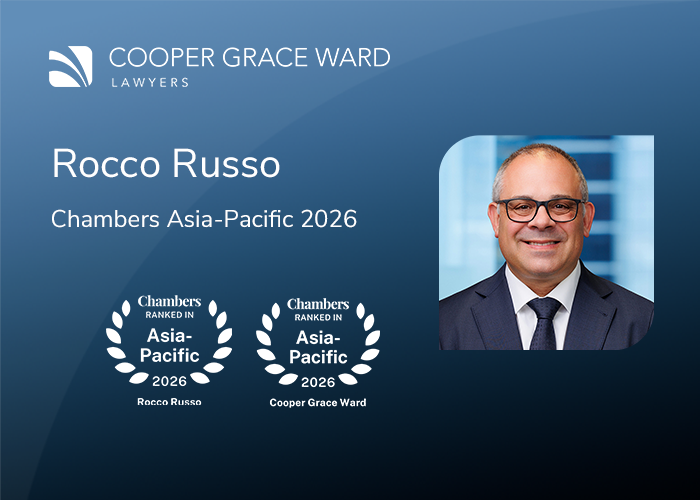It has often been assumed that a claimant with an injury resulting in a degree of permanent impairment of 20% or more was entitled to recover counsel’s fees on settlement of a claim, pursuant to the Workers’ Compensation and Rehabilitation Regulation 2014. However, the Queensland Supreme Court has now definitively held that there is no such entitlement.
In the recent Supreme Court decision of Anderson v Pickles Auctions Pty Ltd [2022] QSC 265, Cooper J dismissed the plaintiff’s application seeking review of a costs assessment, particularly the costs assessor’s decision to disallow the plaintiff’s claim for counsel’s fees. The costs assessor had upheld the defendant’s objection to those outlays on the basis that such fees were not recoverable pursuant to reg 137 of the Workers’ Compensation and Rehabilitation Regulation 2014.
Background
The plaintiff had sustained an injury with a degree of permanent impairment (DPI) of 20% or more. His claim was settled before trial on the basis that his costs would be paid in accordance with Part 8, Division 2 of the Workers’ Compensation and Rehabilitation Regulation 2014.
The plaintiff’s costs proceeded to a formal assessment by a costs assessor. The plaintiff sought to claim the costs of both senior and junior counsel.
The trial had been set down for two days. Liability had been admitted prior to the plaintiff briefing senior counsel. The plaintiff had intended to call five witnesses at trial: himself, an orthopaedic surgeon, an occupational therapist and two lay witnesses.
The plaintiff’s application to the Court challenged two aspects of the costs assessment:
- The costs assessor upheld the defendant’s objections with respect to the plaintiff’s claim for counsel’s fees, on the basis that such fees were not recoverable pursuant to reg 137 of the Regulations. Regs 135 to 137 in Part 8, Division 2 of the Regulations apply to workers with an injury with a DPI of 20% or more. Reg 137 outlines the only outlays that can be claimed.
- In the alternative, the costs assessor disallowed junior counsel’s fees on the basis that the plaintiff could not claim the costs of both senior and junior counsel.
Decision of the Supreme Court
In relation to the statutory interpretation issue, Cooper J concluded that, where a settlement is reached before trial or the claim has proceeded to judgment but the plaintiff has not beaten their written final offer (WFO):
‘…on the proper construction of the provisions of Part 8, Division 2 of the Regulation, a claimant is not entitled to recover counsel’s fees as part of his or her costs calculated in accordance with those provisions’.
In reaching this conclusion, his Honour made the following observations:
- The only indication of an entitlement to recover counsel’s fees in the Regulations comes in the opening words of reg 137: ‘In addition to legal costs …’. However, the term ‘legal costs’ in the opening words of reg 137(1) cannot be construed so broadly as to conclude counsel’s fees as well as solicitor’s fees.
- The plaintiff’s main argument was that the logical conclusion of the costs assessor’s approach would be that any worker with an injury resulting in a DPI of 20% or more could never recover counsel’s fees, even after total success at trial. The plaintiff argued that this would be plainly absurd and manifestly unfair. However, his Honour concluded that the Regulations would not operate to exclude counsel’s fees from the assessment of the plaintiff’s costs under an order pursuant to section 312 of the Workers’ Compensation and Rehabilitation Act 2003 (WCRA) (i.e. where the claimant beats their WFO and is entitled to an order for indemnity costs) on the basis that section 312 invokes the term ‘indemnity basis’, which bears the meaning given to it by the UCPR. Therefore, the absurdity or unfairness is avoided.
- A claimant with a DPI of 20% or more who succeeds in obtaining an award of damages but does not beat their WFO (meaning they are not entitled to an indemnity costs order pursuant to section 312 of the WCRA) is only entitled to their costs assessed in accordance with the Regulations (which will not be inclusive of counsel’s fees). Therefore, they are in a significantly worse position with respect to costs than a claimant with a DPI of 20% or more who beats their WFO. While, on its face, this seems unfair, it is consistent with the legislative objective, i.e., encouraging claimants to make reasonable written offers as part of the compulsory conference process.
Cooper J went on to consider whether, if he was incorrect on the statutory interpretation point, the plaintiff should be entitled to claim the costs of two counsel. The plaintiff argued that the engagement of both senior and junior counsel was warranted on the basis that there was a dispute as to:
- the seriousness of the plaintiff’s injuries
- the plaintiff’s future employment prospects
- the plaintiff’s likely future earnings but for the subject incident
- the impact of the subject injury and unrelated medical conditions on the plaintiff’s work capacity
- medical causation issues.
His Honour accepted the defendant’s submission that the matters identified by the plaintiff arise in many personal injury proceedings. There was insufficient evidence before his Honour to suggest that those matters in the plaintiff’s case involved a degree of complexity that warranted briefing two counsel. His Honour therefore refused to overturn the cost assessor’s decision that the plaintiff could not claim costs of both counsel.
Conclusion
The decision provides some certainty in relation to an issue that had not previously been the subject of judicial consideration, confirming that where there is a settlement of a claim before trial or the claim has proceeded to judgment but the plaintiff has not beaten their WFO, counsel’s fees are not recoverable by an injured worker.
The decision also serves as a reminder that a party is not able to claim, as a matter of course, the costs of two counsel and that it needs to be established that the case involved a sufficient degree of complexity in order for this to be considered ‘reasonably necessary or proper’.







